Property Law Analysis: George's Eviction and Tenancy Rights
VerifiedAdded on 2022/11/22
|7
|2469
|412
Homework Assignment
AI Summary
This assignment provides legal advice to George regarding his potential eviction from a property. The analysis focuses on the legal concepts of joint tenancy and tenancy in common, exploring the implications of the right of survivorship and the existence of a will. The scenario involves George, Rose, and Paul, examining whether George has a right to reside in the property and whether he can recover funds he invested in the property. The assignment explains how George's rights would differ if the house was conveyed as tenants-in-common and Rose named George as her sole beneficiary in her will. The analysis draws on legal principles and case law, including Williams v Hensmann and Shafeeg bin Salim Talib v Fatimah bte Abud bin Talib. The assignment also touches on the impact of a mortgage and provides guidance on debt recovery options for George.
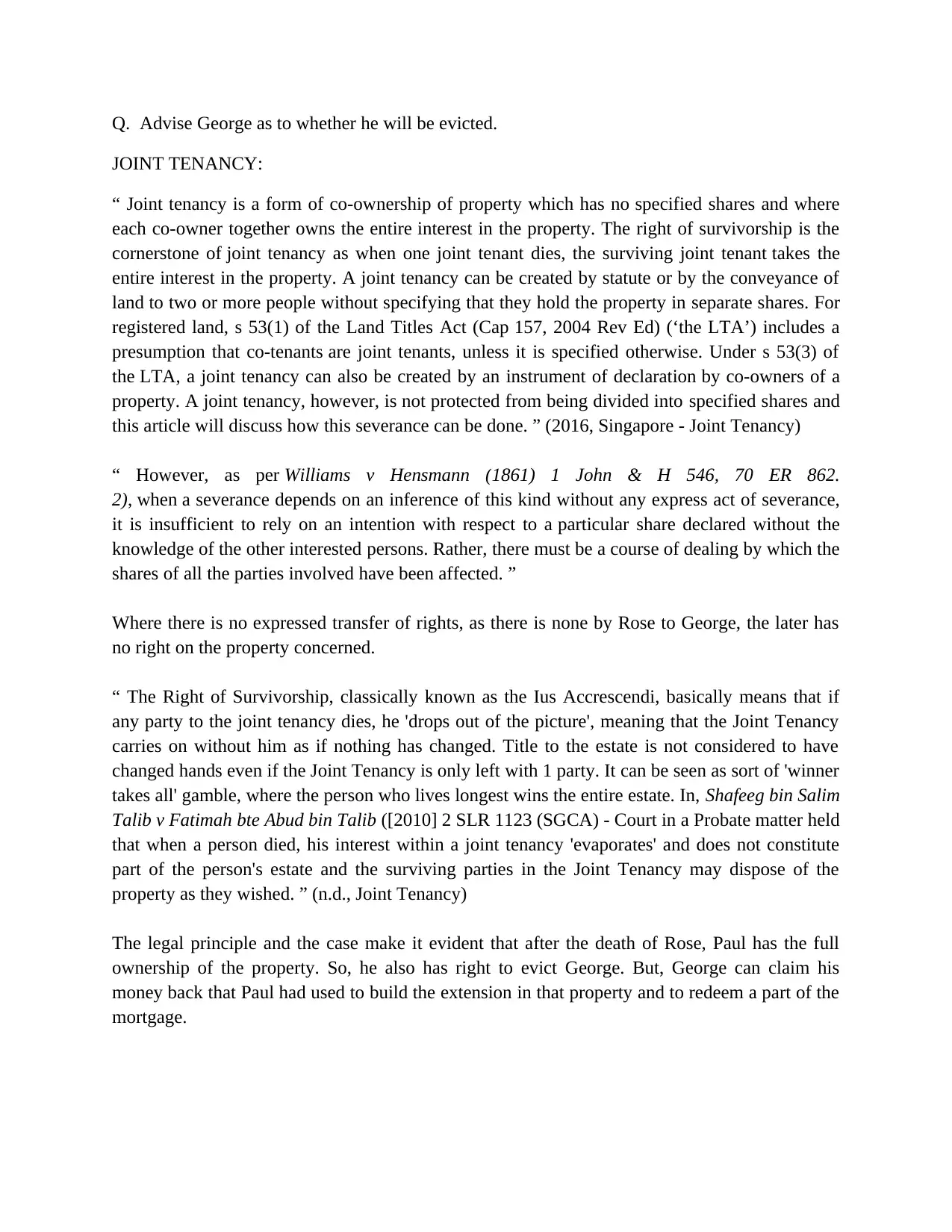
Q. Advise George as to whether he will be evicted.
JOINT TENANCY:
“ Joint tenancy is a form of co-ownership of property which has no specified shares and where
each co-owner together owns the entire interest in the property. The right of survivorship is the
cornerstone of joint tenancy as when one joint tenant dies, the surviving joint tenant takes the
entire interest in the property. A joint tenancy can be created by statute or by the conveyance of
land to two or more people without specifying that they hold the property in separate shares. For
registered land, s 53(1) of the Land Titles Act (Cap 157, 2004 Rev Ed) (‘the LTA’) includes a
presumption that co-tenants are joint tenants, unless it is specified otherwise. Under s 53(3) of
the LTA, a joint tenancy can also be created by an instrument of declaration by co-owners of a
property. A joint tenancy, however, is not protected from being divided into specified shares and
this article will discuss how this severance can be done. ” (2016, Singapore - Joint Tenancy)
“ However, as per Williams v Hensmann (1861) 1 John & H 546, 70 ER 862.
2), when a severance depends on an inference of this kind without any express act of severance,
it is insufficient to rely on an intention with respect to a particular share declared without the
knowledge of the other interested persons. Rather, there must be a course of dealing by which the
shares of all the parties involved have been affected. ”
Where there is no expressed transfer of rights, as there is none by Rose to George, the later has
no right on the property concerned.
“ The Right of Survivorship, classically known as the Ius Accrescendi, basically means that if
any party to the joint tenancy dies, he 'drops out of the picture', meaning that the Joint Tenancy
carries on without him as if nothing has changed. Title to the estate is not considered to have
changed hands even if the Joint Tenancy is only left with 1 party. It can be seen as sort of 'winner
takes all' gamble, where the person who lives longest wins the entire estate. In, Shafeeg bin Salim
Talib v Fatimah bte Abud bin Talib ([2010] 2 SLR 1123 (SGCA) - Court in a Probate matter held
that when a person died, his interest within a joint tenancy 'evaporates' and does not constitute
part of the person's estate and the surviving parties in the Joint Tenancy may dispose of the
property as they wished. ” (n.d., Joint Tenancy)
The legal principle and the case make it evident that after the death of Rose, Paul has the full
ownership of the property. So, he also has right to evict George. But, George can claim his
money back that Paul had used to build the extension in that property and to redeem a part of the
mortgage.
JOINT TENANCY:
“ Joint tenancy is a form of co-ownership of property which has no specified shares and where
each co-owner together owns the entire interest in the property. The right of survivorship is the
cornerstone of joint tenancy as when one joint tenant dies, the surviving joint tenant takes the
entire interest in the property. A joint tenancy can be created by statute or by the conveyance of
land to two or more people without specifying that they hold the property in separate shares. For
registered land, s 53(1) of the Land Titles Act (Cap 157, 2004 Rev Ed) (‘the LTA’) includes a
presumption that co-tenants are joint tenants, unless it is specified otherwise. Under s 53(3) of
the LTA, a joint tenancy can also be created by an instrument of declaration by co-owners of a
property. A joint tenancy, however, is not protected from being divided into specified shares and
this article will discuss how this severance can be done. ” (2016, Singapore - Joint Tenancy)
“ However, as per Williams v Hensmann (1861) 1 John & H 546, 70 ER 862.
2), when a severance depends on an inference of this kind without any express act of severance,
it is insufficient to rely on an intention with respect to a particular share declared without the
knowledge of the other interested persons. Rather, there must be a course of dealing by which the
shares of all the parties involved have been affected. ”
Where there is no expressed transfer of rights, as there is none by Rose to George, the later has
no right on the property concerned.
“ The Right of Survivorship, classically known as the Ius Accrescendi, basically means that if
any party to the joint tenancy dies, he 'drops out of the picture', meaning that the Joint Tenancy
carries on without him as if nothing has changed. Title to the estate is not considered to have
changed hands even if the Joint Tenancy is only left with 1 party. It can be seen as sort of 'winner
takes all' gamble, where the person who lives longest wins the entire estate. In, Shafeeg bin Salim
Talib v Fatimah bte Abud bin Talib ([2010] 2 SLR 1123 (SGCA) - Court in a Probate matter held
that when a person died, his interest within a joint tenancy 'evaporates' and does not constitute
part of the person's estate and the surviving parties in the Joint Tenancy may dispose of the
property as they wished. ” (n.d., Joint Tenancy)
The legal principle and the case make it evident that after the death of Rose, Paul has the full
ownership of the property. So, he also has right to evict George. But, George can claim his
money back that Paul had used to build the extension in that property and to redeem a part of the
mortgage.
Paraphrase This Document
Need a fresh take? Get an instant paraphrase of this document with our AI Paraphraser
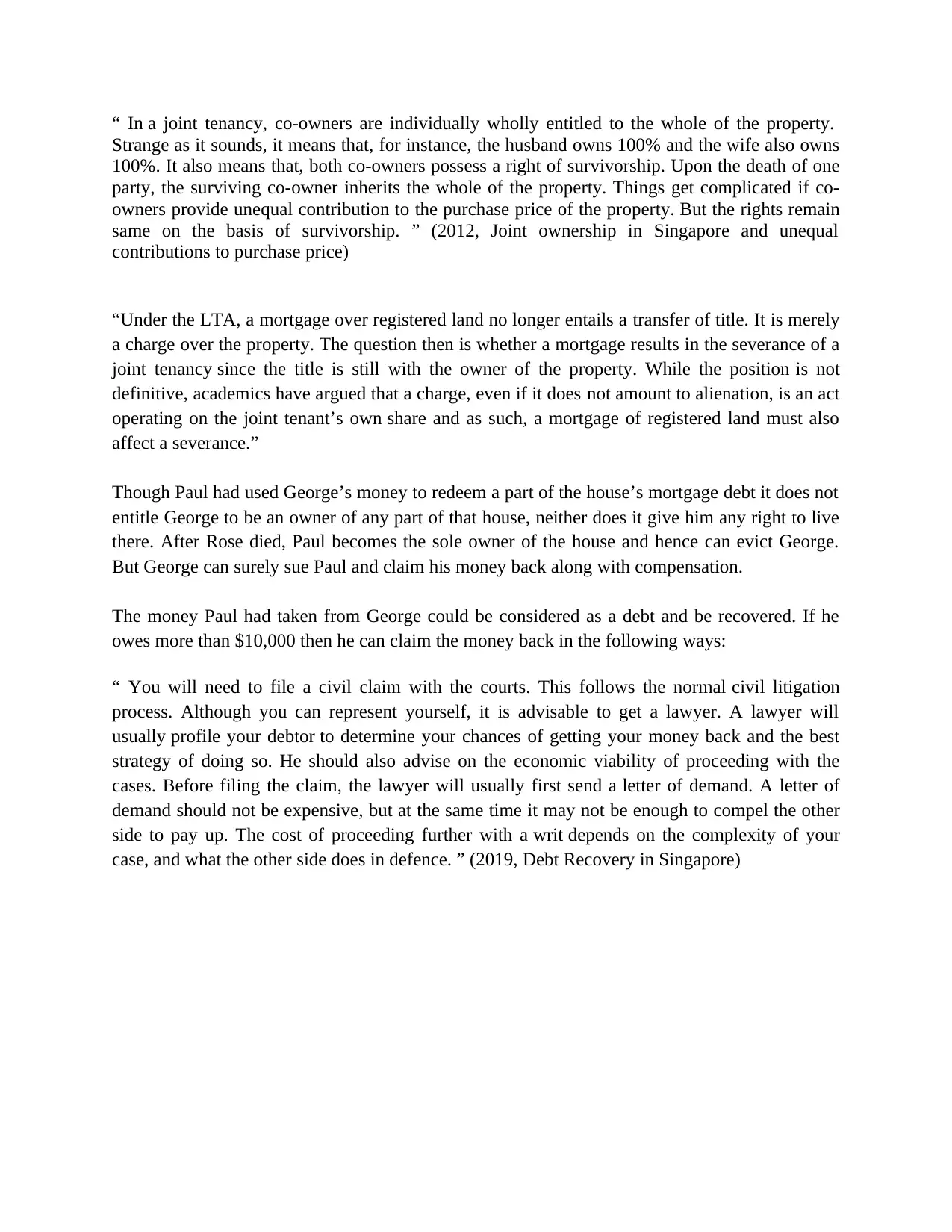
“ In a joint tenancy, co-owners are individually wholly entitled to the whole of the property.
Strange as it sounds, it means that, for instance, the husband owns 100% and the wife also owns
100%. It also means that, both co-owners possess a right of survivorship. Upon the death of one
party, the surviving co-owner inherits the whole of the property. Things get complicated if co-
owners provide unequal contribution to the purchase price of the property. But the rights remain
same on the basis of survivorship. ” (2012, Joint ownership in Singapore and unequal
contributions to purchase price)
“Under the LTA, a mortgage over registered land no longer entails a transfer of title. It is merely
a charge over the property. The question then is whether a mortgage results in the severance of a
joint tenancy since the title is still with the owner of the property. While the position is not
definitive, academics have argued that a charge, even if it does not amount to alienation, is an act
operating on the joint tenant’s own share and as such, a mortgage of registered land must also
affect a severance.”
Though Paul had used George’s money to redeem a part of the house’s mortgage debt it does not
entitle George to be an owner of any part of that house, neither does it give him any right to live
there. After Rose died, Paul becomes the sole owner of the house and hence can evict George.
But George can surely sue Paul and claim his money back along with compensation.
The money Paul had taken from George could be considered as a debt and be recovered. If he
owes more than $10,000 then he can claim the money back in the following ways:
“ You will need to file a civil claim with the courts. This follows the normal civil litigation
process. Although you can represent yourself, it is advisable to get a lawyer. A lawyer will
usually profile your debtor to determine your chances of getting your money back and the best
strategy of doing so. He should also advise on the economic viability of proceeding with the
cases. Before filing the claim, the lawyer will usually first send a letter of demand. A letter of
demand should not be expensive, but at the same time it may not be enough to compel the other
side to pay up. The cost of proceeding further with a writ depends on the complexity of your
case, and what the other side does in defence. ” (2019, Debt Recovery in Singapore)
Strange as it sounds, it means that, for instance, the husband owns 100% and the wife also owns
100%. It also means that, both co-owners possess a right of survivorship. Upon the death of one
party, the surviving co-owner inherits the whole of the property. Things get complicated if co-
owners provide unequal contribution to the purchase price of the property. But the rights remain
same on the basis of survivorship. ” (2012, Joint ownership in Singapore and unequal
contributions to purchase price)
“Under the LTA, a mortgage over registered land no longer entails a transfer of title. It is merely
a charge over the property. The question then is whether a mortgage results in the severance of a
joint tenancy since the title is still with the owner of the property. While the position is not
definitive, academics have argued that a charge, even if it does not amount to alienation, is an act
operating on the joint tenant’s own share and as such, a mortgage of registered land must also
affect a severance.”
Though Paul had used George’s money to redeem a part of the house’s mortgage debt it does not
entitle George to be an owner of any part of that house, neither does it give him any right to live
there. After Rose died, Paul becomes the sole owner of the house and hence can evict George.
But George can surely sue Paul and claim his money back along with compensation.
The money Paul had taken from George could be considered as a debt and be recovered. If he
owes more than $10,000 then he can claim the money back in the following ways:
“ You will need to file a civil claim with the courts. This follows the normal civil litigation
process. Although you can represent yourself, it is advisable to get a lawyer. A lawyer will
usually profile your debtor to determine your chances of getting your money back and the best
strategy of doing so. He should also advise on the economic viability of proceeding with the
cases. Before filing the claim, the lawyer will usually first send a letter of demand. A letter of
demand should not be expensive, but at the same time it may not be enough to compel the other
side to pay up. The cost of proceeding further with a writ depends on the complexity of your
case, and what the other side does in defence. ” (2019, Debt Recovery in Singapore)
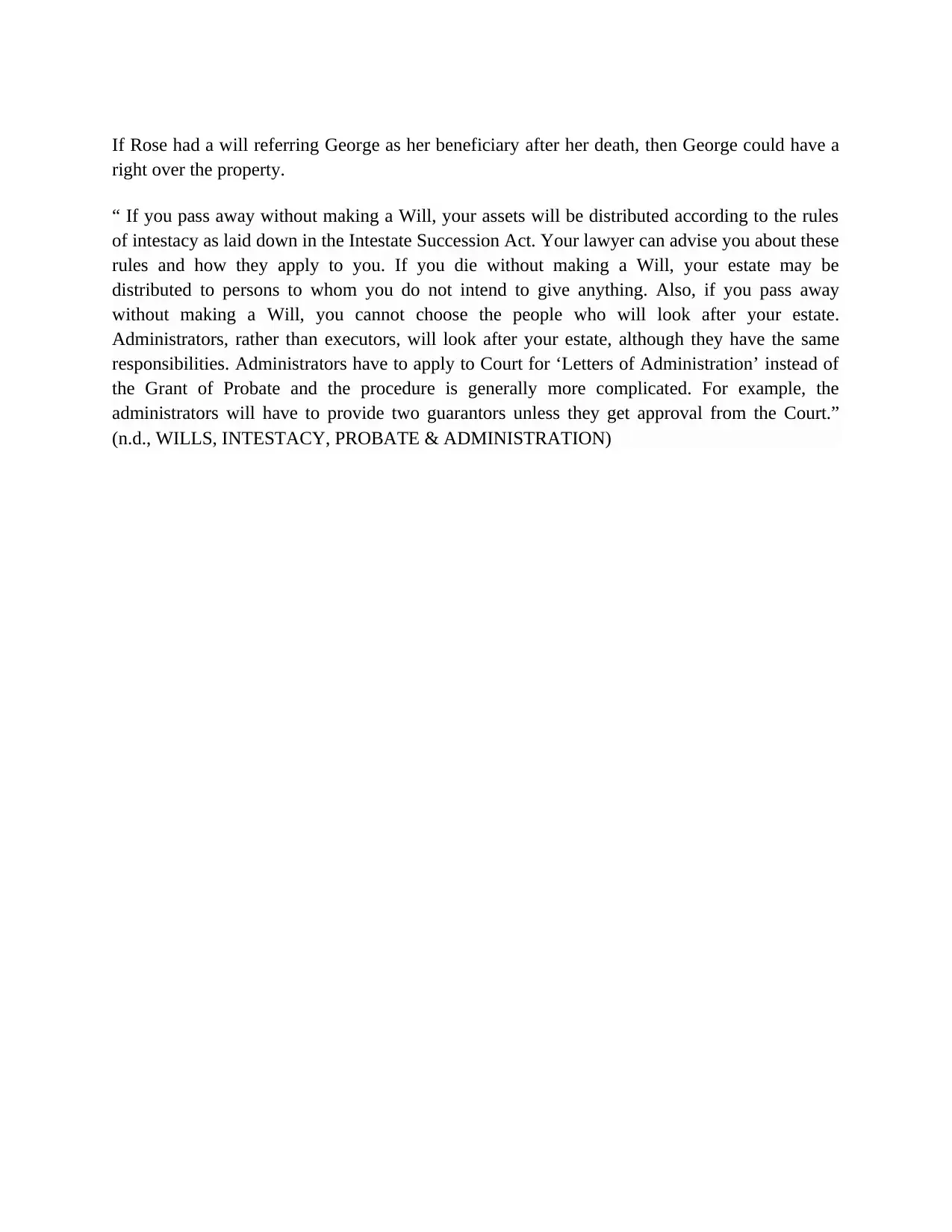
If Rose had a will referring George as her beneficiary after her death, then George could have a
right over the property.
“ If you pass away without making a Will, your assets will be distributed according to the rules
of intestacy as laid down in the Intestate Succession Act. Your lawyer can advise you about these
rules and how they apply to you. If you die without making a Will, your estate may be
distributed to persons to whom you do not intend to give anything. Also, if you pass away
without making a Will, you cannot choose the people who will look after your estate.
Administrators, rather than executors, will look after your estate, although they have the same
responsibilities. Administrators have to apply to Court for ‘Letters of Administration’ instead of
the Grant of Probate and the procedure is generally more complicated. For example, the
administrators will have to provide two guarantors unless they get approval from the Court.”
(n.d., WILLS, INTESTACY, PROBATE & ADMINISTRATION)
right over the property.
“ If you pass away without making a Will, your assets will be distributed according to the rules
of intestacy as laid down in the Intestate Succession Act. Your lawyer can advise you about these
rules and how they apply to you. If you die without making a Will, your estate may be
distributed to persons to whom you do not intend to give anything. Also, if you pass away
without making a Will, you cannot choose the people who will look after your estate.
Administrators, rather than executors, will look after your estate, although they have the same
responsibilities. Administrators have to apply to Court for ‘Letters of Administration’ instead of
the Grant of Probate and the procedure is generally more complicated. For example, the
administrators will have to provide two guarantors unless they get approval from the Court.”
(n.d., WILLS, INTESTACY, PROBATE & ADMINISTRATION)
⊘ This is a preview!⊘
Do you want full access?
Subscribe today to unlock all pages.

Trusted by 1+ million students worldwide
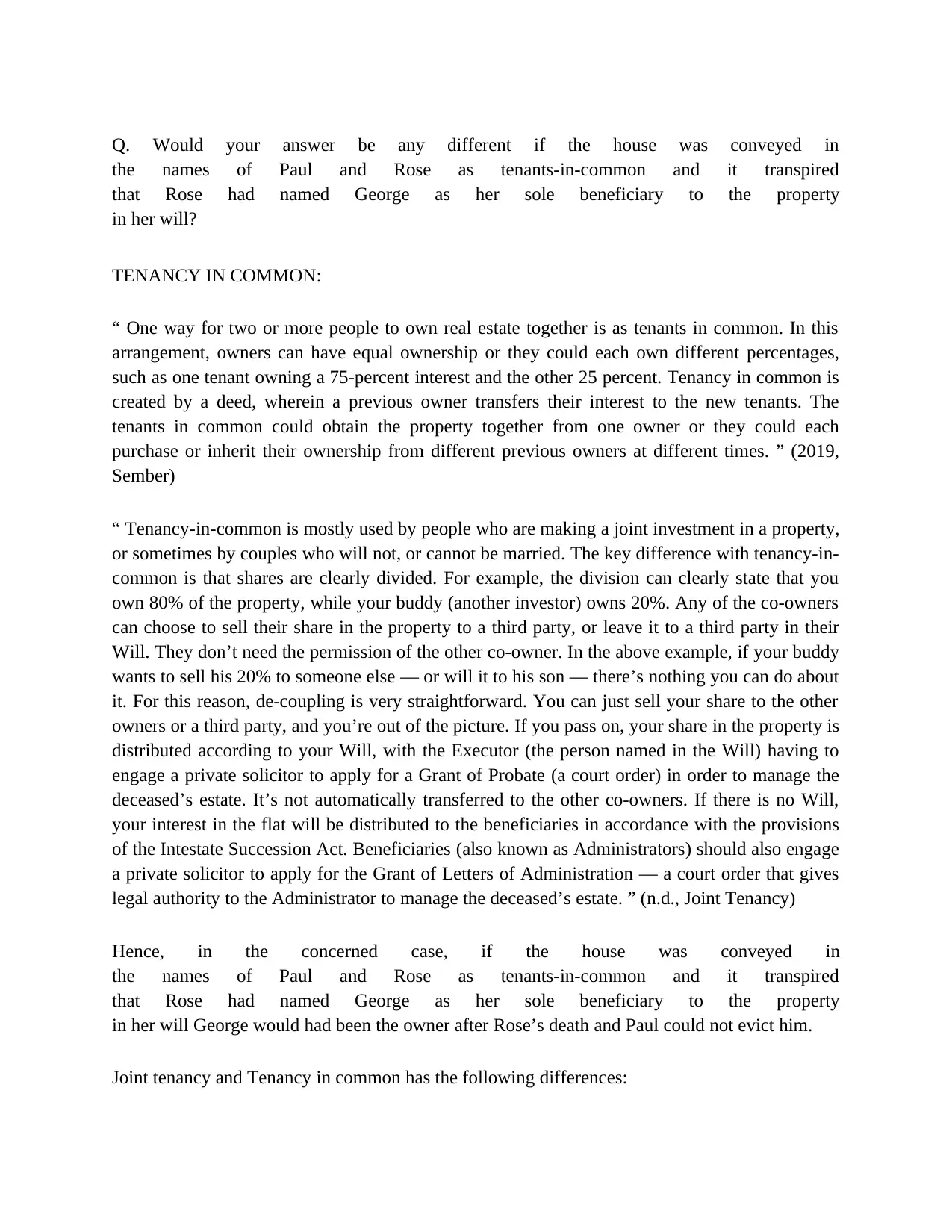
Q. Would your answer be any different if the house was conveyed in
the names of Paul and Rose as tenants-in-common and it transpired
that Rose had named George as her sole beneficiary to the property
in her will?
TENANCY IN COMMON:
“ One way for two or more people to own real estate together is as tenants in common. In this
arrangement, owners can have equal ownership or they could each own different percentages,
such as one tenant owning a 75-percent interest and the other 25 percent. Tenancy in common is
created by a deed, wherein a previous owner transfers their interest to the new tenants. The
tenants in common could obtain the property together from one owner or they could each
purchase or inherit their ownership from different previous owners at different times. ” (2019,
Sember)
“ Tenancy-in-common is mostly used by people who are making a joint investment in a property,
or sometimes by couples who will not, or cannot be married. The key difference with tenancy-in-
common is that shares are clearly divided. For example, the division can clearly state that you
own 80% of the property, while your buddy (another investor) owns 20%. Any of the co-owners
can choose to sell their share in the property to a third party, or leave it to a third party in their
Will. They don’t need the permission of the other co-owner. In the above example, if your buddy
wants to sell his 20% to someone else — or will it to his son — there’s nothing you can do about
it. For this reason, de-coupling is very straightforward. You can just sell your share to the other
owners or a third party, and you’re out of the picture. If you pass on, your share in the property is
distributed according to your Will, with the Executor (the person named in the Will) having to
engage a private solicitor to apply for a Grant of Probate (a court order) in order to manage the
deceased’s estate. It’s not automatically transferred to the other co-owners. If there is no Will,
your interest in the flat will be distributed to the beneficiaries in accordance with the provisions
of the Intestate Succession Act. Beneficiaries (also known as Administrators) should also engage
a private solicitor to apply for the Grant of Letters of Administration — a court order that gives
legal authority to the Administrator to manage the deceased’s estate. ” (n.d., Joint Tenancy)
Hence, in the concerned case, if the house was conveyed in
the names of Paul and Rose as tenants-in-common and it transpired
that Rose had named George as her sole beneficiary to the property
in her will George would had been the owner after Rose’s death and Paul could not evict him.
Joint tenancy and Tenancy in common has the following differences:
the names of Paul and Rose as tenants-in-common and it transpired
that Rose had named George as her sole beneficiary to the property
in her will?
TENANCY IN COMMON:
“ One way for two or more people to own real estate together is as tenants in common. In this
arrangement, owners can have equal ownership or they could each own different percentages,
such as one tenant owning a 75-percent interest and the other 25 percent. Tenancy in common is
created by a deed, wherein a previous owner transfers their interest to the new tenants. The
tenants in common could obtain the property together from one owner or they could each
purchase or inherit their ownership from different previous owners at different times. ” (2019,
Sember)
“ Tenancy-in-common is mostly used by people who are making a joint investment in a property,
or sometimes by couples who will not, or cannot be married. The key difference with tenancy-in-
common is that shares are clearly divided. For example, the division can clearly state that you
own 80% of the property, while your buddy (another investor) owns 20%. Any of the co-owners
can choose to sell their share in the property to a third party, or leave it to a third party in their
Will. They don’t need the permission of the other co-owner. In the above example, if your buddy
wants to sell his 20% to someone else — or will it to his son — there’s nothing you can do about
it. For this reason, de-coupling is very straightforward. You can just sell your share to the other
owners or a third party, and you’re out of the picture. If you pass on, your share in the property is
distributed according to your Will, with the Executor (the person named in the Will) having to
engage a private solicitor to apply for a Grant of Probate (a court order) in order to manage the
deceased’s estate. It’s not automatically transferred to the other co-owners. If there is no Will,
your interest in the flat will be distributed to the beneficiaries in accordance with the provisions
of the Intestate Succession Act. Beneficiaries (also known as Administrators) should also engage
a private solicitor to apply for the Grant of Letters of Administration — a court order that gives
legal authority to the Administrator to manage the deceased’s estate. ” (n.d., Joint Tenancy)
Hence, in the concerned case, if the house was conveyed in
the names of Paul and Rose as tenants-in-common and it transpired
that Rose had named George as her sole beneficiary to the property
in her will George would had been the owner after Rose’s death and Paul could not evict him.
Joint tenancy and Tenancy in common has the following differences:
Paraphrase This Document
Need a fresh take? Get an instant paraphrase of this document with our AI Paraphraser
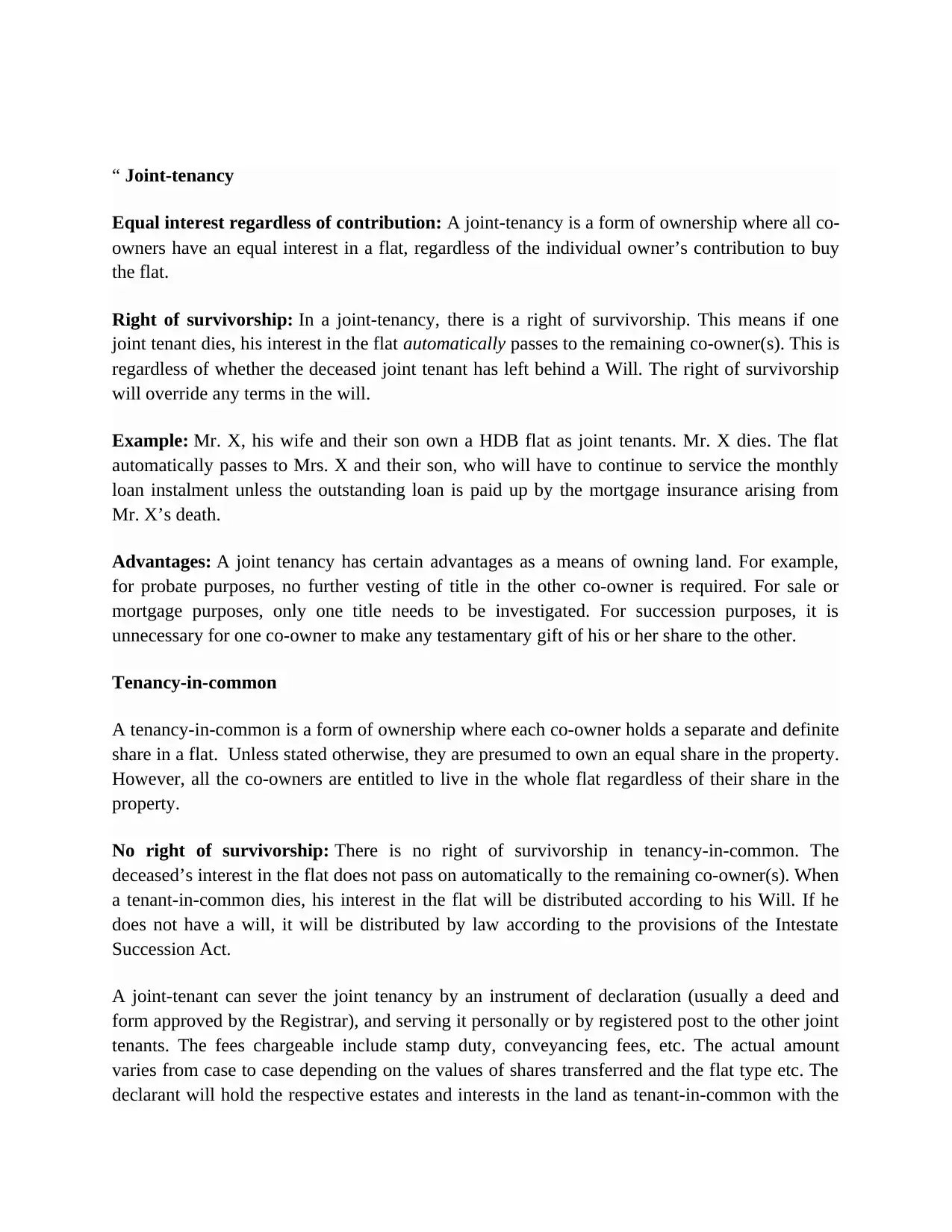
“ Joint-tenancy
Equal interest regardless of contribution: A joint-tenancy is a form of ownership where all co-
owners have an equal interest in a flat, regardless of the individual owner’s contribution to buy
the flat.
Right of survivorship: In a joint-tenancy, there is a right of survivorship. This means if one
joint tenant dies, his interest in the flat automatically passes to the remaining co-owner(s). This is
regardless of whether the deceased joint tenant has left behind a Will. The right of survivorship
will override any terms in the will.
Example: Mr. X, his wife and their son own a HDB flat as joint tenants. Mr. X dies. The flat
automatically passes to Mrs. X and their son, who will have to continue to service the monthly
loan instalment unless the outstanding loan is paid up by the mortgage insurance arising from
Mr. X’s death.
Advantages: A joint tenancy has certain advantages as a means of owning land. For example,
for probate purposes, no further vesting of title in the other co-owner is required. For sale or
mortgage purposes, only one title needs to be investigated. For succession purposes, it is
unnecessary for one co-owner to make any testamentary gift of his or her share to the other.
Tenancy-in-common
A tenancy-in-common is a form of ownership where each co-owner holds a separate and definite
share in a flat. Unless stated otherwise, they are presumed to own an equal share in the property.
However, all the co-owners are entitled to live in the whole flat regardless of their share in the
property.
No right of survivorship: There is no right of survivorship in tenancy-in-common. The
deceased’s interest in the flat does not pass on automatically to the remaining co-owner(s). When
a tenant-in-common dies, his interest in the flat will be distributed according to his Will. If he
does not have a will, it will be distributed by law according to the provisions of the Intestate
Succession Act.
A joint-tenant can sever the joint tenancy by an instrument of declaration (usually a deed and
form approved by the Registrar), and serving it personally or by registered post to the other joint
tenants. The fees chargeable include stamp duty, conveyancing fees, etc. The actual amount
varies from case to case depending on the values of shares transferred and the flat type etc. The
declarant will hold the respective estates and interests in the land as tenant-in-common with the
Equal interest regardless of contribution: A joint-tenancy is a form of ownership where all co-
owners have an equal interest in a flat, regardless of the individual owner’s contribution to buy
the flat.
Right of survivorship: In a joint-tenancy, there is a right of survivorship. This means if one
joint tenant dies, his interest in the flat automatically passes to the remaining co-owner(s). This is
regardless of whether the deceased joint tenant has left behind a Will. The right of survivorship
will override any terms in the will.
Example: Mr. X, his wife and their son own a HDB flat as joint tenants. Mr. X dies. The flat
automatically passes to Mrs. X and their son, who will have to continue to service the monthly
loan instalment unless the outstanding loan is paid up by the mortgage insurance arising from
Mr. X’s death.
Advantages: A joint tenancy has certain advantages as a means of owning land. For example,
for probate purposes, no further vesting of title in the other co-owner is required. For sale or
mortgage purposes, only one title needs to be investigated. For succession purposes, it is
unnecessary for one co-owner to make any testamentary gift of his or her share to the other.
Tenancy-in-common
A tenancy-in-common is a form of ownership where each co-owner holds a separate and definite
share in a flat. Unless stated otherwise, they are presumed to own an equal share in the property.
However, all the co-owners are entitled to live in the whole flat regardless of their share in the
property.
No right of survivorship: There is no right of survivorship in tenancy-in-common. The
deceased’s interest in the flat does not pass on automatically to the remaining co-owner(s). When
a tenant-in-common dies, his interest in the flat will be distributed according to his Will. If he
does not have a will, it will be distributed by law according to the provisions of the Intestate
Succession Act.
A joint-tenant can sever the joint tenancy by an instrument of declaration (usually a deed and
form approved by the Registrar), and serving it personally or by registered post to the other joint
tenants. The fees chargeable include stamp duty, conveyancing fees, etc. The actual amount
varies from case to case depending on the values of shares transferred and the flat type etc. The
declarant will hold the respective estates and interests in the land as tenant-in-common with the

remaining joint-tenants, and the Registrar of Titles will equally apportion the shares in the
registered land between the declarant and the remaining joint-tenants. If a joint-owner cannot be
located, a presumption of death certificate can be filed with the court after the person has
disappeared for more than 7 years. ” (n.d., Property)
Thus, the answer would have been different in case of tenancy in common.
registered land between the declarant and the remaining joint-tenants. If a joint-owner cannot be
located, a presumption of death certificate can be filed with the court after the person has
disappeared for more than 7 years. ” (n.d., Property)
Thus, the answer would have been different in case of tenancy in common.
⊘ This is a preview!⊘
Do you want full access?
Subscribe today to unlock all pages.

Trusted by 1+ million students worldwide
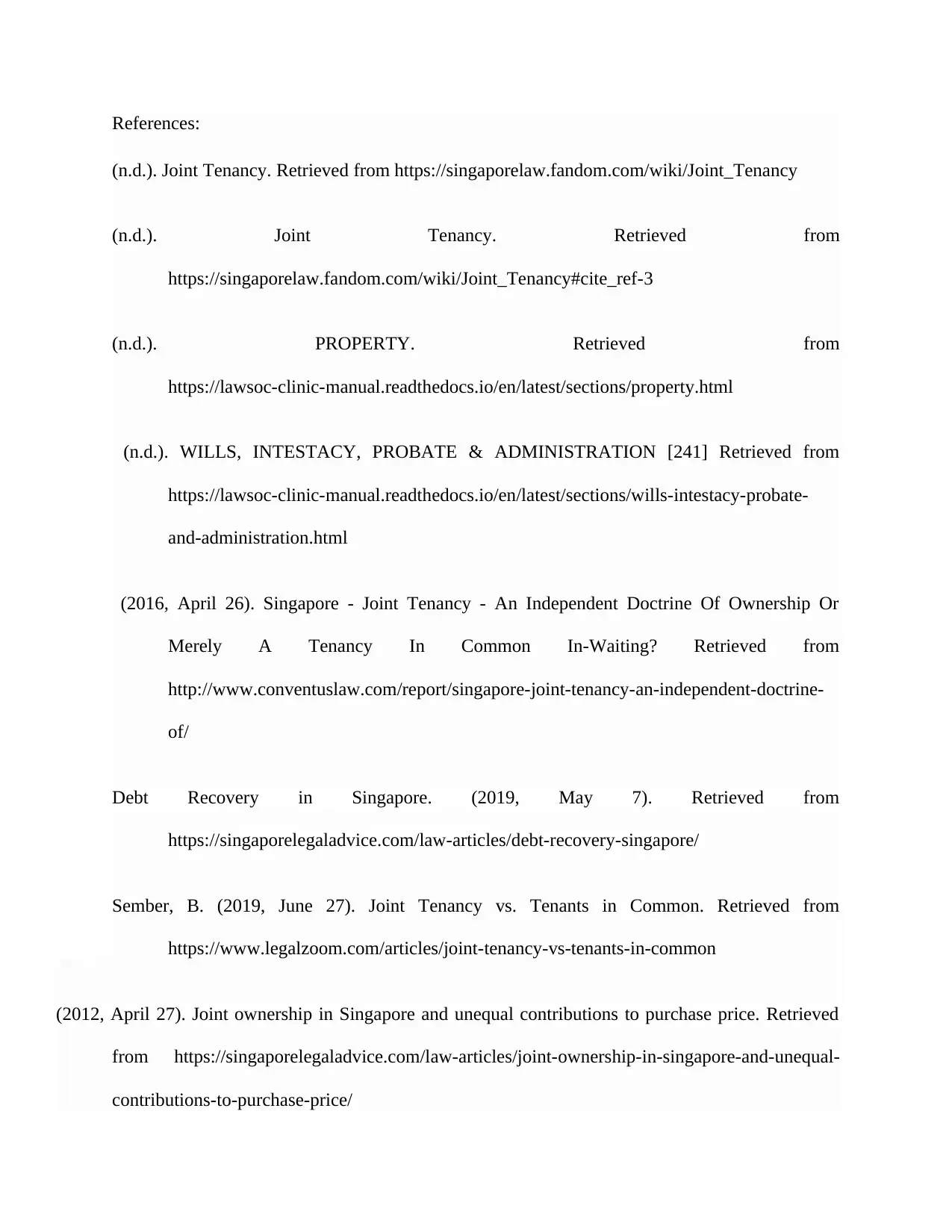
References:
(n.d.). Joint Tenancy. Retrieved from https://singaporelaw.fandom.com/wiki/Joint_Tenancy
(n.d.). Joint Tenancy. Retrieved from
https://singaporelaw.fandom.com/wiki/Joint_Tenancy#cite_ref-3
(n.d.). PROPERTY. Retrieved from
https://lawsoc-clinic-manual.readthedocs.io/en/latest/sections/property.html
(n.d.). WILLS, INTESTACY, PROBATE & ADMINISTRATION [241] Retrieved from
https://lawsoc-clinic-manual.readthedocs.io/en/latest/sections/wills-intestacy-probate-
and-administration.html
(2016, April 26). Singapore - Joint Tenancy - An Independent Doctrine Of Ownership Or
Merely A Tenancy In Common In-Waiting? Retrieved from
http://www.conventuslaw.com/report/singapore-joint-tenancy-an-independent-doctrine-
of/
Debt Recovery in Singapore. (2019, May 7). Retrieved from
https://singaporelegaladvice.com/law-articles/debt-recovery-singapore/
Sember, B. (2019, June 27). Joint Tenancy vs. Tenants in Common. Retrieved from
https://www.legalzoom.com/articles/joint-tenancy-vs-tenants-in-common
(2012, April 27). Joint ownership in Singapore and unequal contributions to purchase price. Retrieved
from https://singaporelegaladvice.com/law-articles/joint-ownership-in-singapore-and-unequal-
contributions-to-purchase-price/
(n.d.). Joint Tenancy. Retrieved from https://singaporelaw.fandom.com/wiki/Joint_Tenancy
(n.d.). Joint Tenancy. Retrieved from
https://singaporelaw.fandom.com/wiki/Joint_Tenancy#cite_ref-3
(n.d.). PROPERTY. Retrieved from
https://lawsoc-clinic-manual.readthedocs.io/en/latest/sections/property.html
(n.d.). WILLS, INTESTACY, PROBATE & ADMINISTRATION [241] Retrieved from
https://lawsoc-clinic-manual.readthedocs.io/en/latest/sections/wills-intestacy-probate-
and-administration.html
(2016, April 26). Singapore - Joint Tenancy - An Independent Doctrine Of Ownership Or
Merely A Tenancy In Common In-Waiting? Retrieved from
http://www.conventuslaw.com/report/singapore-joint-tenancy-an-independent-doctrine-
of/
Debt Recovery in Singapore. (2019, May 7). Retrieved from
https://singaporelegaladvice.com/law-articles/debt-recovery-singapore/
Sember, B. (2019, June 27). Joint Tenancy vs. Tenants in Common. Retrieved from
https://www.legalzoom.com/articles/joint-tenancy-vs-tenants-in-common
(2012, April 27). Joint ownership in Singapore and unequal contributions to purchase price. Retrieved
from https://singaporelegaladvice.com/law-articles/joint-ownership-in-singapore-and-unequal-
contributions-to-purchase-price/
1 out of 7
Related Documents
Your All-in-One AI-Powered Toolkit for Academic Success.
+13062052269
info@desklib.com
Available 24*7 on WhatsApp / Email
![[object Object]](/_next/static/media/star-bottom.7253800d.svg)
Unlock your academic potential
Copyright © 2020–2026 A2Z Services. All Rights Reserved. Developed and managed by ZUCOL.





